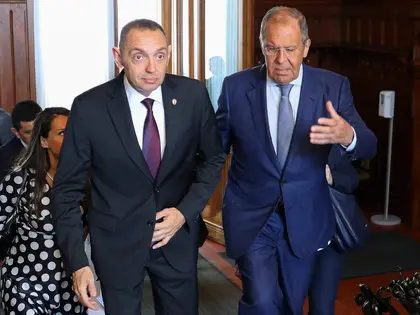As Serbia continues to fuel instability in the Western Balkans, the US has imposed anti-corruption sanctions against Serbian intelligence chief Aleksandar Vulin.
Serbian President Aleksandar Vucic rushed to Vulin’s defense, claiming that the allegations of corruption are groundless. No “cocaine was found in Vulin’s office, but rather in the White House,” Vucic declared, trolling Washington over the recent scandal regarding discovery of the Class A drug in the West Wing.
- View the freshest war in ukraine update in the Kyiv Post’s daily news pieces that came out today.
- Obtain the most recent updates on the Ukraine situation today.
JOIN US ON TELEGRAM
Follow our coverage of the war on the @Kyivpost_official.
Vulin is not only corrupt but has also played an important role in cultivating Russian influence in the Balkans and destabilizing the region. The Biden administration deserves credit for finally sanctioning him. However, for these sanctions to have any real bite, the European Union and United Kingdom need to step up too.
Vulin served as Serbia’s defense minister from 2017 to 2020 and then as interior minister until 2022. Late last year, Belgrade announced that he would take over as head of Serbia’s Security Intelligence Agency, the BIA.
The US Treasury Department accused Vulin of engaging in “transnational organized crime, illegal narcotics trafficking, and misuse of public office” for personal and political gain. The intelligence chief, who previously led Serbia’s defense and interior ministries, has also used his positions to facilitate Russian malign influence in the region, the Treasury alleged.

‘Espionage Is a Constant Threat’ – EU Proposes Fresh Sanctions on Russia, Warns of Orbital Dangers
Exploiting corruption in the Western Balkans is central to the Kremlin’s efforts to cultivate influence in the region. Moscow has used corrupt actors like Vulin to exploit economic, ethnic, and religious splits in the region, sowing instability to challenge and undermine the West.
Vulin has cultivated a strong relationship with the Russian security apparatus. In 2021, while serving as interior minister, he met with Russian Security Council Secretary Nikolai Patrushev to pledge cooperation on combating “color revolutions;” Moscow’s term for pro-Western popular uprisings against authoritarian regimes.
That same year, Serbian intelligence reportedly wiretapped a Russian opposition seminar held in Belgrade. Vulin allegedly then hand-delivered the transcripts to Patrushev, leading to the detention of the Russian opposition member who led the seminar.
Even as he cultivates Russian influence, Vulin has also promoted Belgrade’s own destabilizing regional ambitions. A long-time advocate of former Serbian president and war criminal Slobodan Milosevic, Vulin has promoted the concept of the “Serbian World.” The aim is to unite all Serbs within a single ethno-state, led by Vucic.
In May, Serbs in northern Kosovo injured more than 30 members of NATO’s peacekeeping forces following confrontations in northern Kosovo. Serbia has used its favorite tactic is to escalate and then de-escalate the crisis in Kosovo and to use it as a bargaining chip with the West. Serbia’s proxy in Bosnia and Herzegovina, Milorad Dodik, has recently threatened with secession.
With Vulin facing accusations of facilitating Russia's influence in Serbia and involvement in organized crime and drug trafficking, Vucic sought to deflect attention from these domestic wrongdoings. In a typical tactical maneuver, he appealed to Serbia’s pro-Russia far-right groups, stating “Aleksandar Vulin was not sanctioned for any crime or corruption or whatever, but because of his position towards the Russian Federation.” Vucic further downplayed the sanctions by pointing out that he too was sanctioned in 1999 when he served as a Minister of Information in the Milosevic government.
Despite US hopes that Serbia will align its policies with the EU, Belgrade has resisted. During an August 2022 visit to Moscow, Vulin reassured Russian Foreign Minister Sergey Lavrov that Belgrade would not join with the West in attempting to isolate Russia. “Serbia is the only state in Europe that didn’t introduce sanctions and was not part of the anti-Russian hysteria,” Vulin said. In fact, Serbia has emerged as a key jurisdiction for Russian sanctions evasion. In 2022, over 1,020 Russian companies were founded in Serbia — a greater than 12-fold increase from the previous year.
Sanctioning Vulin by the Biden administration is a step in the right direction, which has vowed to crack down on both corruption and Russian malign influence and sanctions evasion. The US sanctions imposed last week freeze any US-based property and assets owned by Vulin and bar US companies from doing business with entities he majority-owns. Vulin’s designation follows similar American sanctions imposed against other Balkan actors for engaging in corruption, undermining democracy, or destabilizing the region.
But unless the EU and UK impose similar measures, sanctions won’t be that painful for Vulin or his Balkan comrades, who tend to do most of their business and vacationing in Europe. The EU, in particular, prefers carrots over sticks but economic incentives will not alter Vucic’s security agenda for the region.
The West must do a better job of imposing costs on destructive Balkan actors. But to do so effectively, the West must act as one. Washington has got the ball rolling. Now it’s time for Europe to step up and do its part.
Ivana Stradner is a Research Fellow and Elaine Dezenski is Senior Director and Head of the Center on Economic and Financial Power at the Foundation for Defense of Democracies.
The views expressed in this opinion article are the author’s and not necessarily those of Kyiv Post.
You can also highlight the text and press Ctrl + Enter











